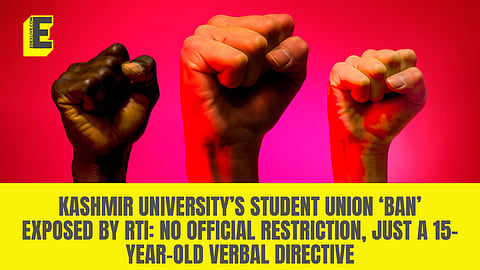

For over 15 years, student activism at the University of Kashmir was believed to be banned.
Campus discussions, protests, and student bodies were stifled, with students fearing repercussions for even contemplating organised representation. However, a recent Right to Information (RTI) filed by Nasir Khuehami, National Convenor of the Jammu Kashmir Students Association, the response has shattered this long-standing perception.
Filed with the Jammu and Kashmir Higher Education Department, the RTI sought clarity on whether a formal directive existed prohibiting student unions in the Union Territory’s universities. The response? No such ban exists — neither from the government nor from the universities themselves.
Yet, Kashmir University’s proctor, in response to the RTI, revealed a startling fact: the supposed “ban” traces back to a 2009 verbal directive by then-Vice-Chancellor Prof Riyaz Punjabi. This decision was never formalised through an official circular, nor did it receive any legal sanction. And yet, it has dictated student politics at the institution for nearly a decade and a half.
A tale of two regions: Jammu vs. Kashmir
In Jammu’s universities — including Jammu University, Central University of Jammu, and Government College for Women, Gandhi Nagar — student activism has thrived. Political student wings like the National Students' Union of India (NSUI) and Akhil Bharatiya Vidyarthi Parishad (ABVP) have actively protested, engaged in student welfare, and held authorities accountable.
But in Kashmir, an atmosphere of fear loomed large. The perception was clear: forming a student union was off-limits. Those who attempted faced intimidation — from administrative summons to unofficial police interventions.
“We launched the Jammu-Kashmir Students Association in 2016, but we had to do it outside Kashmir, in Uttarakhand. The authorities ensured that no student body could take shape within the Valley,” said Nasir Khuehami in an exclusive interview with EdexLive.
Kashmir University’s ‘transparency’ excuse
The University of Kashmir justified the absence of student unions by claiming it had a “transparent” grievance redressal system. “But the counter-question is: who accredited the university as ‘transparent’?” asked Nasir.
Every major institution in India — be it Jawaharlal Nehru University (JNU), Aligarh Muslim University (AMU), or Delhi University (DU) — operates within transparent frameworks while also having active student unions. Transparency and student representation are not mutually exclusive. If anything, they strengthen each other.
“The reality is starkly different,” said Nasir.
“Students at Kashmir University know that raising concerns gets them summoned by the proctor the very next day, and the university’s response of justifying the lack of a student union, because they have a proper grievance cell, is just misleading, especially for those who are familiar with the dis-functional system of the university,” he added.
Why the silence? The ‘law and order’ excuse
Kashmir University authorities argue that the security situation in the region makes student unions a potential threat. They fear that students could be influenced by “wrong motives” that destabilise the institution. But students see this as nothing more than a convenient excuse.
“Student bodies act as watchdogs. The administration doesn’t want accountability, so it hides behind the law-and-order excuse,” said Khuehami.
What next? The fight for representation begins
With the RTI response proving that no official ban exists, student leaders and activists are gearing up for the next steps. The Jammu-Kashmir Students Association has already approached Lieutenant Governor Manoj Sinha and plans to escalate the matter to Chief Minister Omar Abdullah.
“The university administration’s stance is outdated, arbitrary, and undemocratic. We will pursue legal and constitutional means to ensure students in Kashmir have the same democratic rights as their counterparts across India,” the convenor asserted.
The fight for a student union at Kashmir colleges is no longer about whether it is “allowed.” It is about restoring a fundamental democratic right.
